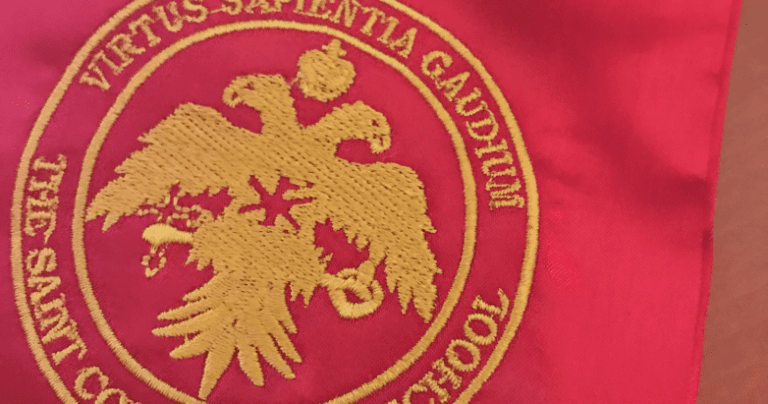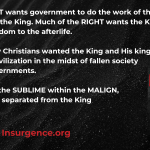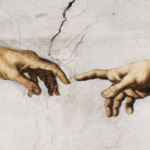We live in perilous times.
 Classical education can help, but only if we take care. The myth that education is the answer apart from the rest of culture may make professors and teachers feel powerful, but prevents us from building the rest of the support structures we need to flourish. Schools are part of a strong civilization, but they are not the only part.
Classical education can help, but only if we take care. The myth that education is the answer apart from the rest of culture may make professors and teachers feel powerful, but prevents us from building the rest of the support structures we need to flourish. Schools are part of a strong civilization, but they are not the only part.
The myth that there is One True Curriculum that will solve our problems for all time might make marketing easier for educrats, but it is a lie none-the-less. People are complicated and so no one approach to learning will be perfect for all. Oddly, this is part of classical education which is radically individualized for each student’s learning style while existing in ancient forms and pathways.
There is nothing to market in true classical education: Socrates is always free.
One hundred years ago a type of classical education, decadent and broken, failed mightily.
World War I featured many classically educated men destroying the civilization that had so much promise, but already had many vices (start with colonialism and keep counting). A difficulty is that they destroyed the hopeful possibilities, setting progress back decades, and lost the virtues of their education while retaining the vices.
The gentleman of 1914 knew the restraint of the philosophers and Christian sages of classical education. By 1917, any beauty, any limits to total war based on ethics, had been ground out of them, because they lacked a firm foundation which said that losing with honor might be better than destroying the civilization to save it with dishonor.
Classical education can degenerate into a civilization crushing system or, at the very least, one incapable of fending off doom.
There is a growing classical education movement in the world, so it is vital we see what went wrong and how we can keep from repeating previous errors.
The men of 1914 had, too often, subsumed the Chapel to the college hall, the don was dominant over the priest. As a result, the restraining power of the Church was lost. The double headed eagle of classical education, Athens talking to Jerusalem, was decapitated leaving only one head: Athens. Religious people responded by attempting to decaptiate the other head where they were powerful: Jerusalem without Athens.
The result, as the Fathers and the Mothers of the Church would have foretold, was doom on both fronts. The man without Athens loses the gravity of reason and the leader without Jerusalem lost the humility that comes with revelation. Piety was for women and emotions: evangelism included billboards cautioning the sinner that “mother’s prayers follow you.” Learning was secular, even if it still had a Christian veneer.
I fear there is a facile attempt to integrate Athens and Jerusalem, instead of letting them live in creative tension. Until King Jesus comes to unite Athens and Jerusalem into the Heavenly New Jerusalem, the City of God, we must live with tension.
This is creative tension and is not bad. Sadly, too many classical schools favor either Athens or Jerusalem. They are superficially Christian, but actually secular or (more often) superficially classical, but actually sectarian. They pretend to do Socratic discussion, but close off any dangerous ideas.
Neither approach will work. The superficially religious school will end up aping the evils of the powerful of the age. In 1918, this might be a defense of colonialism and in 2018 the vices of our porno-soaked ruling classes. The school that forgets Athens for Jerusalem will always become weird, sectarian, cut off from life. Why? They see secular evil and try to cure it with the equal evil of clericalism.
We need the bishops and the King, the church and the state. In the American Republic, this is the power of a free Church under the First Amendment that checks the power of the state. The Church in such a Republic says: “No King but King Jesus” and so limits the possibility of tyranny.
Simultaneously, in 1917 the family was cut off from classical education as the boarding school weakened the power of parents, particularly mothers. We need schools that encourage life with father and mother, not a Christian Hogwarts that weakens family structure.
Worse, the schools (think Rugby under Arnold) became little worlds to themselves doing the job of family, Church, and business. God help us, but academics often ask for a business leader’s money while despising an area they cannot begin to understand.
We must value the world of creation, industry, and not just the world of books.
The entire cosmos is a School for our souls, but that School has many rooms: Church, state, social structures, families, and educational institutions. We are in School, but most School is not in school. By the time of the First World War, too many of the leadership class did not learn the deep truths a classical education could provide. Instead, they gained class status and power. Classical education gave them the tools to do great things, but too often those tools were used in service to bad ideas that were not subject to the very critical scrutiny, the dialectic, that classical education produces.
Still worse, those inclined to criticize became mere critics, sitting at the margins. Much worse, some of the brightest and best used their classical education to give intellectual heft to revolutionary regimes that would kill millions. Think Lenin sitting next to a Swiss lake pounding out complex arguments that would be used to justify the destruction of Mother Russia.
Classical education must:
1. Not make the don, the professor, a man apart, cut off from the business leader or the the Church
2. Not become cut off from the Church, but exist in dialog with the Church and (if a Christian school) in submission to the Church on faith and practice.
3. Not become cut off from secular societies, but exist in dialog with the outside world and (if a Christian school) ignoring no truth, however inconvenient.
4. Not become cut off from family.
5. Not become cut off from industry: the noble creation of things.
Sign up for the classical education that learned from World War I: college and K-12.

———————————————












